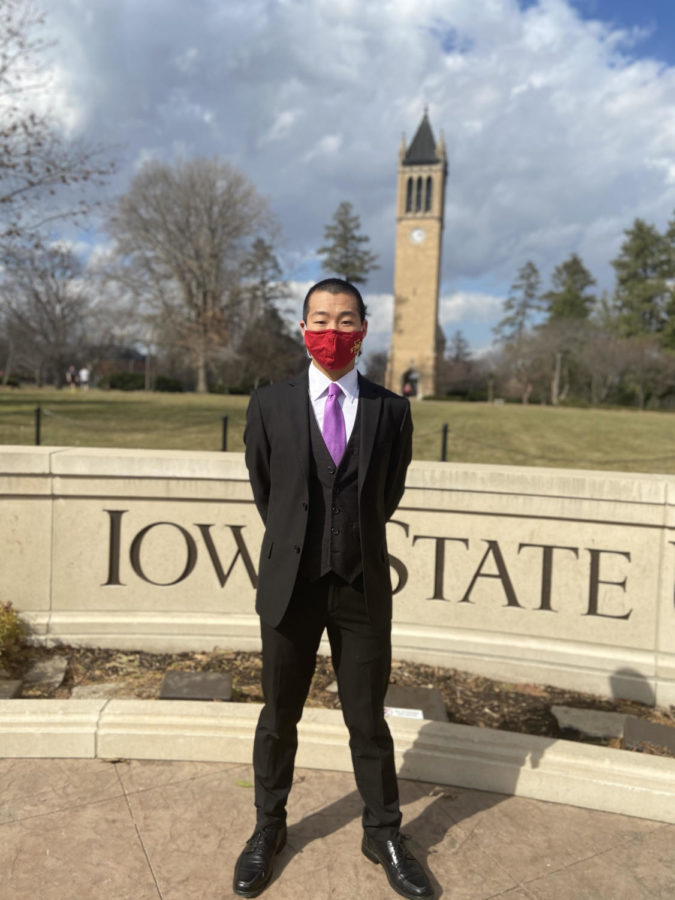Student Government candidate profiles: Charles Yang
Charles Yang is a candidate running for one of three Liberal Arts and Sciences positions in Student Government.
March 17, 2021
Charles Yang is a College of Liberal Arts and Sciences senator candidate for Student Government. Yang is a second-year student and academic senior studying data science.
What do you hope to accomplish in this position?
I’m hoping to do three things:
1. Bring awareness to and destigmatize mental health. We’ve made great progress recently, but I feel like it’s being forgotten once again. We should treat mental illness like any other biological illness — with compassion and precision.
2. Improve campus sustainability. We could benefit from more solar trash cans and new solar recycling cans, all complete with graphics on them detailing what goes in which can. Small efforts, big cumulative effect.
3. Foster open discussion on things that matter. We should be able to play gracefully with ideas of all kinds and use our intelligence to prove ourselves correct. I don’t believe screaming that a behavior is wrong is a sufficient argument for someone to desist. You’re not going to convince a white nationalist that populism is bad by screaming at them, in person or on social media.
What will you do to promote a greater understanding between Student Government and the student body?
When I was a freshman, I had no clue how much Student Government did. So many events, student organizations and lectures were sponsored by Student Government or the election commission. I feel comfortable arguing that a majority of students didn’t even know Student Government decides what lectures are put forth. My goal is to do outreach with ordinary students, especially incoming freshmen so that they know how Student Government affects their adventure at Iowa State. Transparency is no longer enough; we need to act to erase the common sentiment that Student Government is gimmicky and useless.
What made you want to run?
I saw that this year’s Student Government was really ineffectual. So many quit during their service, and I find that quite disappointing, considering that they were elected by people who care and want to see things get done. I hope to reinstate a precedent of maintaining responsibility in government, even if it’s “just Student Government.” I think there’s so much potential to be realized, considering that we are trusting over $2.6 million in student fees to Student Government.
I also noticed that the Committee of Lectures has only been allowing one point of view to be spoken about landline issues, especially race. This is not an open discussion but rather de-facto censorship of otherwise productive ideas. I will push to uphold the principles of a free exchange of productive ideas. If your beliefs include removing the voice of your opponents, then those beliefs are not productive, even if part of your beliefs are correct.
What do you think is most important about this position for students?
An LAS senator has the power to voice the opinions of his/her constituents. These can be tangible complaints about the state of LAS facilities or more grandiose topics such as identity. Since many of society’s most important concepts come from universities, especially from LAS, we should pay close attention to what students are thinking and doing.
Why do you think you’re qualified/experienced for this position?
I spend a lot of time outside of school learning. I read contemporary philosophy, especially on things that matter, including diversity of identities and ideas. You can expect me to approach every topic with precision in my speech and empathy in my delivery. Additionally, I have spent two semesters now as a tutor and currently work as a TA. The leadership skills, work ethic and communication abilities will benefit me as a student senator.
What will you do to help your college specifically?
I think within LAS, we’ve forgotten what it meant to be “liberal.” Liberal means to have new ideas and to challenge the status quo. Nowadays, it seems that only one line of thought is considered acceptable, and any criticism of it brings a fury on social media. The reaction to the inappropriate statement by Fritz-Shrader proves this. It seems it could’ve been handled much better, ideally with less screeching during Senate sessions and more precision.
I will help LAS by enshrining the free exchange of productive ideas. I hope to be an example for those seeking to engage in discourse on things that matter.







